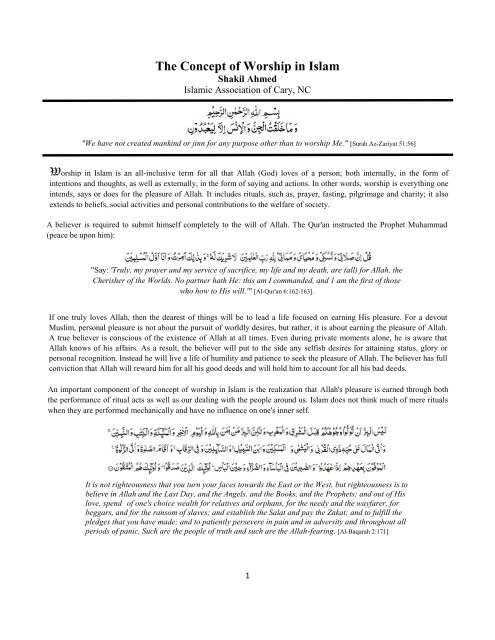The Concept of Worship in Islam - Cary Masjid
The Concept of Worship in Islam - Cary Masjid
The Concept of Worship in Islam - Cary Masjid
Create successful ePaper yourself
Turn your PDF publications into a flip-book with our unique Google optimized e-Paper software.
<strong>The</strong> <strong>Concept</strong> <strong>of</strong> <strong>Worship</strong> <strong>in</strong> <strong>Islam</strong><br />
Shakil Ahmed<br />
<strong>Islam</strong>ic Association <strong>of</strong> <strong>Cary</strong>, NC<br />
"We have not created mank<strong>in</strong>d or j<strong>in</strong>n for any purpose other than to worship Me." [Surah Az-Zariyat 51:56]<br />
<strong>Worship</strong> <strong>in</strong> <strong>Islam</strong> is an all-<strong>in</strong>clusive term for all that Allah (God) loves <strong>of</strong> a person; both <strong>in</strong>ternally, <strong>in</strong> the form <strong>of</strong><br />
<strong>in</strong>tentions and thoughts, as well as externally, <strong>in</strong> the form <strong>of</strong> say<strong>in</strong>g and actions. In other words, worship is everyth<strong>in</strong>g one<br />
<strong>in</strong>tends, says or does for the pleasure <strong>of</strong> Allah. It <strong>in</strong>cludes rituals, such as, prayer, fast<strong>in</strong>g, pilgrimage and charity; it also<br />
extends to beliefs, social activities and personal contributions to the welfare <strong>of</strong> society.<br />
A believer is required to submit himself completely to the will <strong>of</strong> Allah. <strong>The</strong> Qur'an <strong>in</strong>structed the Prophet Muhammad<br />
(peace be upon him):<br />
"Say: 'Truly, my prayer and my service <strong>of</strong> sacrifice, my life and my death, are (all) for Allah, the<br />
Cherisher <strong>of</strong> the Worlds. No partner hath He: this am I commanded, and 1 am the first <strong>of</strong> those<br />
who how to His will.'" [Al-Qur'an 6:162-163].<br />
If one truly loves Allah, then the dearest <strong>of</strong> th<strong>in</strong>gs will be to lead a life focused on earn<strong>in</strong>g His pleasure. For a devout<br />
Muslim, personal pleasure is not about the pursuit <strong>of</strong> worldly desires, but rather, it is about earn<strong>in</strong>g the pleasure <strong>of</strong> Allah.<br />
A true believer is conscious <strong>of</strong> the existence <strong>of</strong> Allah at all times. Even dur<strong>in</strong>g private moments alone, he is aware that<br />
Allah knows <strong>of</strong> his affairs. As a result, the believer will put to the side any selfish desires for atta<strong>in</strong><strong>in</strong>g status, glory or<br />
personal recognition. Instead he will live a life <strong>of</strong> humility and patience to seek the pleasure <strong>of</strong> Allah. <strong>The</strong> believer has full<br />
conviction that Allah will reward him for all his good deeds and will hold him to account for all his bad deeds.<br />
An important component <strong>of</strong> the concept <strong>of</strong> worship <strong>in</strong> <strong>Islam</strong> is the realization that Allah's pleasure is earned through both<br />
the performance <strong>of</strong> ritual acts as well as our deal<strong>in</strong>g with the people around us. <strong>Islam</strong> does not th<strong>in</strong>k much <strong>of</strong> mere rituals<br />
when they are performed mechanically and have no <strong>in</strong>fluence on one's <strong>in</strong>ner self.<br />
It is not righteousness that you turn your faces towards the East or the West, but righteousness is to<br />
believe <strong>in</strong> Allah and the Last Day, and the Angels, and the Books, and the Prophets; and out <strong>of</strong> His<br />
love, spend <strong>of</strong> one's choice wealth for relatives and orphans, for the needy and the wayfarer, for<br />
beggars, and for the ransom <strong>of</strong> slaves; and establish the Salat and pay the Zakat; and to fulfill the<br />
pledges that you have made; and to patiently persevere <strong>in</strong> pa<strong>in</strong> and <strong>in</strong> adversity and throughout all<br />
periods <strong>of</strong> panic. Such are the people <strong>of</strong> truth and such are the Allah-fear<strong>in</strong>g. [Al-Baqarah 2:171]<br />
1
<strong>The</strong> deeds <strong>in</strong> the above verse are the deeds <strong>of</strong> righteousness and they are part <strong>of</strong> worship. <strong>The</strong> Prophet (peace be upon him)<br />
told us about faith, which is the basis <strong>of</strong> worship. “Faith is made up <strong>of</strong> about sixty branches: the highest <strong>of</strong> which is the<br />
belief <strong>in</strong> the Oneness <strong>of</strong> Allah, and the lowest <strong>in</strong> the scale <strong>of</strong> worship is remov<strong>in</strong>g obstacles and dirt from people s way."<br />
<strong>The</strong> Prophet (peace be upon him) said: "Whoever f<strong>in</strong>ds himself at the nightfall tired <strong>of</strong> his work, Allah will forgive his s<strong>in</strong>s?<br />
Seek<strong>in</strong>g knowledge is one <strong>of</strong> the highest forms <strong>of</strong> worship. <strong>The</strong> Prophet (peace be upon him) said, "seek<strong>in</strong>g knowledge is a<br />
(religious) duty on every Muslim" In another say<strong>in</strong>g he said: "Seek<strong>in</strong>g knowledge for one hour is better than pray<strong>in</strong>g for<br />
seventy years."<br />
Social courtesy and cooperation are a part <strong>of</strong> worship when done for the sake <strong>of</strong> Allah as the Prophet (peace be upon him)<br />
told us: "Receiv<strong>in</strong>g your friend with a smile is a type <strong>of</strong> charity and putt<strong>in</strong>g some water <strong>in</strong> your neighbor's bucket is a<br />
charity." It is worth not<strong>in</strong>g that even perform<strong>in</strong>g one's duties is considered an act <strong>of</strong> worship. <strong>The</strong> Prophet (peace be upon<br />
him) told us that whatever one spends for his family is a type <strong>of</strong> charity. K<strong>in</strong>dness to the members <strong>of</strong> one's family is an act<br />
<strong>of</strong> worship as is putt<strong>in</strong>g a piece <strong>of</strong> food lov<strong>in</strong>gly <strong>in</strong> the mouth <strong>of</strong> one's spouse. Furthermore, even the acts that we enjoy,<br />
when performed accord<strong>in</strong>g to Div<strong>in</strong>e <strong>in</strong>structions are considered acts <strong>of</strong> worship.<br />
It is clear that the <strong>Concept</strong> <strong>of</strong> worship <strong>in</strong> <strong>Islam</strong> is comprehensive. It <strong>in</strong>cludes all positive activities <strong>of</strong> the <strong>in</strong>dividual and is <strong>in</strong><br />
agreement with the all-<strong>in</strong>clusive nature <strong>of</strong> <strong>Islam</strong> as a way <strong>of</strong> life. It regulates human life on all levels: the <strong>in</strong>dividual, the<br />
social, the economic, the political and the spiritual. All activities are considered by Allah as acts <strong>of</strong> worship, if done <strong>in</strong><br />
conformance to His guidance. This should lead us to seek Allah's pleasure <strong>in</strong> our daily actions and always try to do them <strong>in</strong><br />
the best possible manner, whether we are be<strong>in</strong>g watched or we are alone. Indeed Allah is the All Know<strong>in</strong>g, the All See<strong>in</strong>g<br />
and the All Hear<strong>in</strong>g.<br />
While worship <strong>in</strong> <strong>Islam</strong> is all encompass<strong>in</strong>g ritual and non-ritual actions, the higher priority is given to the ritual acts <strong>of</strong><br />
worship. If performed <strong>in</strong> true spirit, the ritual worship elevates the <strong>in</strong>dividual morally and spiritually and enables one to<br />
perform all activities accord<strong>in</strong>g to the guidance and pleasure <strong>of</strong> Allah.<br />
Salah (Prayers): Among ritual worships, Salah occupies the key position for two reasons. Firstly, it is the dist<strong>in</strong>ctive<br />
mark <strong>of</strong> a believer. Secondly, it protects an <strong>in</strong>dividual from all sorts <strong>of</strong> abom<strong>in</strong>ations and vices by provid<strong>in</strong>g him chances <strong>of</strong><br />
direct communication with his Creator five times a day. Dur<strong>in</strong>g the Salah, a believer not only praises Allah but also renews<br />
his covenant with Him and seeks His guidance, forgiveness and pleasure. Salah is the first practical manifestation <strong>of</strong> Faith<br />
that leads to salvation. <strong>The</strong> Prophet (peace be upon him) further emphasized: "Those who <strong>of</strong>fer their Salah with great care<br />
and punctuality, will f<strong>in</strong>d it a light, a pro<strong>of</strong> <strong>of</strong> their faith and cause for their salvation on the Day <strong>of</strong> Judgment." Allah<br />
declares that those believers who <strong>of</strong>fer their prayers with s<strong>in</strong>cerity are the successful.<br />
"Successful <strong>in</strong>deed are the Believers, those who humble themselves <strong>in</strong> their prayers."<br />
[Al-Mum<strong>in</strong>oon 23:1 -2]<br />
Zakah (Obligatory Charity): After Salah, the Zakah is an important pillar <strong>of</strong> <strong>Islam</strong>. In the Qur'an, Salah and Zakah<br />
have mostly been mentioned together. Like Salah, Zakah is a manifestation <strong>of</strong> faith that affirms that Allah is the sole owner<br />
<strong>of</strong> everyth<strong>in</strong>g <strong>in</strong> the universe. Muslims believe that the wealth they own is a trust and that Allah expects them to discharge<br />
a def<strong>in</strong>ed portion <strong>of</strong> it to the needy. In this respect Zakah is an act <strong>of</strong> devotion that, like prayer, br<strong>in</strong>gs the believer nearer to<br />
his Lord. Zakah is also a means <strong>of</strong> redistribution <strong>of</strong> wealth <strong>in</strong> a way that reduces differences between classes and groups. It<br />
makes a fair contribution to social stability. By purg<strong>in</strong>g the soul <strong>of</strong> the rich from selfishness, and the soul <strong>of</strong> the poor from<br />
envy and resentment aga<strong>in</strong>st society, it closes down the channels lead<strong>in</strong>g to class hatred. Such stability is not merely based<br />
on the personal feel<strong>in</strong>gs <strong>of</strong> the rich: it stands on a firmly established right. Zakah is an act <strong>of</strong> worship that benefits the<br />
attitude <strong>of</strong> the giver by remov<strong>in</strong>g from their heart greed and selfishness and replac<strong>in</strong>g it with a feel<strong>in</strong>g <strong>of</strong> compassion for<br />
mank<strong>in</strong>d.<br />
2
Siyam (Fast<strong>in</strong>g): Siyam (fast<strong>in</strong>g dur<strong>in</strong>g the day time <strong>in</strong> the month <strong>of</strong> Ramadan) is another pillar <strong>of</strong> <strong>Islam</strong> which<br />
functions to make a Muslim pure from "with<strong>in</strong>". By such purity, one promotes what is good, and shuns what is evil.<br />
<strong>The</strong> glorious Qur'an confirms,<br />
"O you who believe! Fast<strong>in</strong>g is prescribed to you as it was prescribed to those before you,<br />
that you may (learn) self-restra<strong>in</strong>t." [Al-Baqarah 2:183].<br />
In an authentic tradition, the Prophet (peace be upon him) reported Allah as say<strong>in</strong>g about the one who fasts: "He suspends<br />
eat<strong>in</strong>g, dr<strong>in</strong>k<strong>in</strong>g, and gratification <strong>of</strong> his sexual passion for My sake." Thus his reward is go<strong>in</strong>g to be accord<strong>in</strong>g to Allah's<br />
great bounty. Whilst many <strong>of</strong> us might have food on the table each and every day, how <strong>of</strong>ten do we reflect on the many<br />
million people <strong>in</strong> the world that do not? Fast<strong>in</strong>g is an act <strong>of</strong> worship that awakens one's conscience, and rem<strong>in</strong>ds an<br />
<strong>in</strong>dividual <strong>of</strong> the suffer<strong>in</strong>g <strong>of</strong> the less fortunate. It thus promotes thankfulness and appreciation to Allah for the many<br />
bounties he has provided us.<br />
Hajj: Lastly, the Hajj (pilgrimage to the House <strong>of</strong> Allah <strong>in</strong> Makkah), which is an act <strong>of</strong> worship that follows the<br />
example <strong>of</strong> the Prophet Abraham, who re-built the first house for the worship <strong>of</strong> the one true Allah <strong>in</strong> Makkah. Muslims<br />
from all corners <strong>of</strong> the world, wear<strong>in</strong>g the same dress, respond to the call <strong>of</strong> Hajj <strong>in</strong> one voice and language: (Here I am at<br />
your service O Lord!). <strong>The</strong>re are many lessons to be learnt from Hajj. Humility, for example, is one. Men go<strong>in</strong>g for the<br />
pilgrimage dress <strong>in</strong> two pla<strong>in</strong> white garments. This is a rem<strong>in</strong>der that Allah is not concerned about the wealth or status that<br />
we have accumulated <strong>in</strong> this world. Instead, when we present ourselves to Allah, everyone is equal and it is only the good<br />
deeds that we have conducted that matter. Dur<strong>in</strong>g Hajj there is a strict exercise <strong>of</strong> self-discipl<strong>in</strong>e, where not only sacred<br />
th<strong>in</strong>gs are revered, but even the lives <strong>of</strong> plants and birds are made <strong>in</strong>violable so that everyth<strong>in</strong>g lives <strong>in</strong> safety. In addition, a<br />
pilgrim is strictly prohibited from enter<strong>in</strong>g any dispute or quarrel with another person, regardless <strong>of</strong> blame.<br />
In summary, the concept <strong>of</strong> worship <strong>in</strong> <strong>Islam</strong> encompasses every aspect <strong>of</strong> human life, and is central to the goal <strong>of</strong> free<strong>in</strong>g<br />
the <strong>in</strong>dividual, as well as society, from the worship <strong>of</strong> created th<strong>in</strong>gs to the worship <strong>of</strong> the Creator <strong>of</strong> all th<strong>in</strong>gs. It is this<br />
concept <strong>of</strong> worship that humanity needs so desperately, and where<strong>in</strong> lies the key to our collective salvation.<br />
[Source: ICNA Publications – acknowledged with gratitude.]<br />
3



